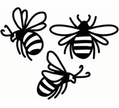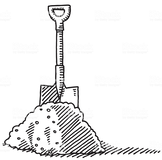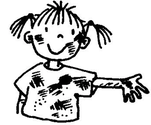 The Latin word sistere means to cause to stand. Sistere has a pile of intriguing descendants. I’m saving my favorite for last. You'd think sistere would be the root of sister. Nope. That's another post entirely. Sistere gave us resist, which showed up in English in the 1300s. Resist is constructed of re-, meaning against + sistere. It means to hold out against. Desist appeared in English in the 1400s & is constructed of de-, meaning off + sistere. Desist means to stand aside, leave off, or cease. I love the idea that its third meaning suggests that the phrase “cease & desist” is redundant. Assist also came to English in the 1400s. Constructed of ad-meaning to + sistere, assist means to stand by, help or assist. Consist came to English in the 1520s, meaning to stand or place together. Its parts are con-, meaning with or together + sistere. Persist is made of per-, meaning thoroughly + sistere. Persist arrived in English in the 1530s. Persist means to continue steadfastly. Insist, to persist or dwell upon, came into English in the 1580s. It’s constructed of in-, meaning upon, + sistere Some less likely descendants of sistere include: exist & existence armistice solstice, subsist & subsistence And what was my motivation to focus on sistere & its progeny? I’m overly fond of one of sistere’s little-known descendants, resistentialism. Paul Jennings coined the word in 1948. Resistentialism is the seemingly spiteful behavior manifested in inanimate objects. Ever known a cranky lawn chair? A difficult stepladder? A recalcitrant printer or computer? Dear readers, what recent experience have you had with resistentialism? My thanks go out to this week’s sources: the OED, Wordnik, Etymonline. & NewYorkTimes.com
4 Comments
 A few years ago I received an unexpected gift. A researcher, author & gentleman named David W. K. Godrich decided I might enjoy the fruit of many years of his and his father’s labor. He sent me A Gaggle of Geese, a two-generation labor of love begun in 1940 and most recently updated in 2011. I so appreciate Mr. Godrich’s generosity. His book consists of 238 pages of lists of collective nouns. Early on in the book, the entries for groups of bees caught my attention & inspired a little research of my own. Though each term in this list may have a slightly different meaning, and some are obviously alternate spellings of the same word, all are established descriptors for groups of bees. an apian of bees an apiary of bees a bike of bees a butt of bees a cast of bees a chit of bees a colony of bees a community of bees a cote of bees an erst of bees a flight of bees a grist of bees a hive of bees a multitude of bees a nest of bees a neast of bees a play of bees a smart of bees a spew of bees a spindle of bees a swarm of bees a swarme of bees Good followers, how many of these are familiar to you? Which are unfamiliar? What new collective noun would you suggest for bees? For groups of readers? For groups of writers? My thanks go out to this week’s sources: the OED, Wordnik, Etymonline. Dictionary of Collective Nouns and Group Terms (Gale Group 2008) & A Gaggle of Geese, by David W. K. Godrich, fifth edition, 2011.  I find it intriguing that human behavior isn’t always humane, at least by my understanding of humane. Like so many things, humane is in the eye of the beholder. Both human & humane have their roots in the Latin word humus, or of the earth (as opposed to of the heavens). Before the Latin made its way to English, though, it passed through French, becoming humain or umain. English speakers in the 1500s used the adjectives human & humane interchangeably. Meanings included: -of man -having qualities befitting human beings -philanthropic -kind -gentle -polite -learned -refined -civilized After a couple of centuries, though, the two adjectives bifurcated. Humane began to mean having qualities befitting human beings, while human meant of man. Interestingly, even after the bifurcation, the opposite of humane can either be inhumane or inhuman. Some words closely related to humane & human include: humanity (1300s) meaning kindness or graciousness -- by the 1400s, humanity meant human nature or human form, & by the 1450s it meant the human race humankind (1640s) a more inclusive form of mankind humanitarian (1794) one who affirms the humanity of Christ, but denies his pre-existence & divinity -- by 1824 humanitarian meant a philanthropist who advocates or practices human action to solve social problems humanoid (1906) was the brand name of a type of cow’s milk the purveyors claimed was closer to human milk than the milk sold by competitors -- by 1920, humanoid meant an anthropological hybrid, & by 1940, it meant having the appearance of being human Good readers, what in this post did you find most unlikely, startling, or just plain weird? Please leave your thoughts in the comments section. My thanks go out to this week’s sources: Merriam-Webster, the OED, Wordnik, & Etymonline.  I find it fascinating that the Latin word humus, meaning of the earth, is the root of human. Though I suppose it’s reasonable to expect Mother Earth would be pretty darned good at giving birth, not only the humans, but to words. In the early 1400s the Latin word humare (a verb form of humus meaning to bury), linked with the prefix ex- made its way into English as exhume, meaning to unearth. I’ll leave it to the sociologists to explain why modern usage continues to embrace the grisly word exhume, but has - for the most part - forgotten the kinder, gentler term, inhume, to put into the ground (which entered English two centuries later). Though Genesis I couldn’t possibly lead to this, it’s no surprise – given the Genesis II telling of creation – that the Hebrew equivalent of humus, adamu, became the name Adam. Humus & adamu admittedly aren’t cognates, but they both mean of the earth, & both have many offspring. Camomile has its roots in humus & means apple of the earth. Camomile entered English in the late 1300s through French & Latin, originating in Greek chamaimelon. Also from humus, chameleon came to English in the mid-1300s, through French & Latin, originating in the Greek term khamaileon, meaning lion of the earth, which most likely comes from a species of chameleon whose crest resembled a lion’s mane. Another Latin offspring of humus was the word humilis, meaning lowly or humble, giving us images of the lowly folk prostrating themselves before the mighty, literally on the ground. In the 1300s, humilis gave us the English words humble & humility. By the 1530s, these words gave birth to the noun humiliation, which in turn, gave us the verb, humiliate. Good readers, please comment on all of this humus-ness, or possibly on Oscar Levant’s commentary on humility: “What the world needs is more geniuses with humility, there are so few of us left.” My thanks go out to this week’s sources: the OED, The Quotation’s Page, Wordnik, Merriam-Webster, & Etymonline.  The word dirt came to English through Middle English (drit or drytt, which meant mud, dirt or dung) originating in the Norse word, drit. Back in the 1300s it was also used figuratively to make fun of people. The word dirty was born some two centuries later (originally dritty to match its Middle English kin). Though dirty originally meant muddy, dirty or dung-covered, by the 1590s it had grown to also mean smutty or morally unclean. When compared with its synonym soil, dirt is one of the myriad words that reflects a prejudice against Germanic, Anglo-Saxon & Norse terms in favor of Latin and Greek (due in part to the events following the Battle of Hastings). We English speakers generally consider soil (from the Latin word solium or solum) to be a classier person’s term for that lowly, horrible word dirt. I have a fascination with this prejudice & expound on it here. But, back to dirt. In the 1670s, English speakers could pull dirty tricks on one another. By 1764, we could ask someone to do our dirty work. By 1821 the term dirt cheap was born. In the 1850s the mining trade gave us the literal term paydirt. By 1873 that term had become figurative, meaning profit or success. It wasn’t until 1926 that dirt picked up the meaning gossip, This usage was introduced by none other than Ernest Hemingway. Though dirty looks have been going on for centuries, we didn’t call them that until 1926. And in 1932 the term dirty old man was born, to be artfully portrayed by Arte Johnson as Tyrone F. Horneigh a mere 40 years later. Please, good followers, leave a thought regarding Tyrone F. Horneigh & his unrequited love for Gladys Ormphby, or maybe say something about dirt. My thanks go out to this week’s sources: Collins Dictionary, the OED, Wordnik, & Etymonline.  I have a fascination with a prejudice in language. Indulge me by considering each set of four synonyms, then speedily categorizing individual words into two lists, one labeled “classy” & one labeled “not classy.” Don't overthink -- just go for it. big large vast great compact miniature little small thin slender gaunt skinny chubby stout fat obese clever astute smart intelligent Next, compare your lists with these: big vast great large small compact little miniature skinny slender thin gaunt chubby stout fat obese clever astute smart intelligent The words on the left are words derived from Norse, Frisian, Dutch, and various Germanic sources. The words on the right mostly come through French from Latin, though one comes directly from Latin, one is Latin through Italian and stout is a Middle Low German word that came to English through French (that last stage being salient to this topic). If you placed most of the words on the left in the “not classy” column and most of the words on the right in the “classy” column, like me, you have absorbed a prejudice that linguists attribute to the events following the Battle of Hastings in 1066. After the big win, the Norman nobles who supported William the Conqueror (formerly known as Guillaume, since he was born in Normandy, France) became the ruling class of England. French became the language of the courts and royalty. This set French and its mother language, Latin, far above the everyday Germanic, Anglo-Saxon & Celtic tongues spoken by the lowly peasants. This system lasted for centuries, as have the prejudices born of it. This prejudice has some intriguing applications for those who write. Precise application of classy vs. non-classy words can subtly influence readers’ impressions of characters & events, encouraging or discouraging trust or likability. Dang, those authors are tricky cusses, aren’t they? Please let me know whether any of this rings true. Did your lists look mostly like my lists or am I just some nutcase who puts too much time into thinking about words? My thanks go out to this week’s sources: the OED, Merriam-Webster, Pixabay, Wordnik, & History.com, & Etymonline.  Etymology is all about sleuthing back to the origin of words. Sadly, even the most hardworking teams of etymologists reach the end of the sleuthing line still asking the word history equivalent of, “Who’s your daddy?” When a word’s parentage is in question, it's in the dictionary is listed as “origin unknown.” This week’s post will cover just a few of the many orphans in the world of words. Pooch was first recorded in 1924. Though a few word historians believe pooch may have some relationship to the word pouch, this American-born synonym for dog has never been officially nailed down. In 1809 the word hike showed up in English (spelled hyke). It meant to walk vigorously. Hike has no known origin, though at the time the similarly parentless word yike carried the same meaning. Pokey, meaning jail or prison was first recorded in 1919. Some etymologists have suggested it may have come from pogie – an 1891 term meaning poorhouse, but like pokey, pogie is of unknown origin. Hanker – as in “I’ve got a hankerin’ for possum stew” – first showed up around 1600, & though it probably came from the Dutch word hunkeren (to hanker), hunkeren is also of unknown origin. Arbor, arboreal, arboretum & arborist all originate in the Latin word arbor, meaning tree, & showed up in English in the 1500s, but the Latin word arbor is an etymological mystery. Squeamish showed up in English in the mid-1400s, meaning disdainful or fastidious. Its Anglo-French parent word escoymous is of unknown origin. Scare showed up in English in the 1590s meaning to frighten. It came from the Norse word skirra, to frighten, shy from, shun, prevent or avert. Skirra is a form of the Norse word skjarr, meaning timid, shy or afraid of. Skjarr has no known parent. About 1600 the verb rant showed up in English, meaning both to be jovial & boisterous, & to talk bombastically. It comes from randten, a Dutch word of unknown origin meaning to talk foolishly or to rave. I find the nearly opposite original meanings of the last two words remarkable. Fellow word-folks, were any of these word orphans worthy of your remark? My thanks go out to this week’s sources: Collins Dictionary, the OED, Wordnik, & Etymonline.  The term reduplication fascinates me. Wouldn’t the term duplication do the job? I love the fact that a redundant-sounding word is used to signify redundancy. According to Merriam Webster, reduplication is an act or instance of doubling or reiterating. Last week’s post covered a few reduplications & this week’s post will cover a few more. Though etymologists aren’t certain, it’s likely that frou-frou is a reduplication of the rustling sound of a dress. It came to English in 1870 from French. Froufrou’s meaning today is fussy details, though in my corner of the world the word froufrou is used to refer to knick-knacks or frilly decorations. Which brings us to knick-knack, a varied reduplication of knack, as in, “he’s got a knack for machines.” Knick-knack’s primary meaning is a pretty trick or subterfuge, which came to English in 1618. By 1682, knick-knack had picked up the secondary meaning, a curious or pleasing trifle more ornamental than useful. A related reduplication is the term chichi or chi-chi, which arrived from France in 1908, carrying two meanings: sophisticated, & pretentious fussiness. Bye-bye is also a reduplication. It started in 1630 as a sound used to lull a child to sleep. By 1709 its similarity to good-bye rubbed off on its meaning. Jibber-jabber is a varied reduplication of jabber, & showed up in 1728 meaning to talk gibberish. Pee-wee is most likely a varied reduplication of wee, meaning little. It came to English in 1848 to describe a small marble, & by 1877 became a bit more generalized, meaning small or tiny children. Etymologists are pretty sure humdrum is a varied reduplication of hum, the sound one might make upon experiencing tedium, which explains why humdrum means tedious or monotonous. Humdrum entered the language in the 1550s. Hip hop is a varied reduplication most of us might guess came to English recently. Surprisingly, Hip hop was in use to mean a successive hopping motion as early as the 1670s. To denote the popular music style, hip hop was first used in 1982. Boogie-woogie is another music-related varied reduplication. Its earliest ancestor appears to have shown up in 1912 as boogie-boo. By 1917 a rent party was referred to as a boogie, & by 1928 that blues style & the term to describe it, boogie-woogie was born. To finish up our look at reduplication, we’ll consider so so (or so-so), which came to English in 1520, meaning in an indifferent, mediocre, or passable manner or degree. And to make so-so even more so, in 1835 someone unveiled so-soish (I kid you not), meaning somewhat so-so, or rather indifferent. Apparently, so-so wasn’t indecisive enough as it stood, so it needed an indecisive ending. In this week’s comments, I’d love to see sentences including as many of the bold words above as possible. My thanks go out to this week’s sources: the OED, Wordnik, Merriam Webster, & Etymonline.  Years ago when I lived on the island of Tutuila in American Samoa, I was fascinated by the culture’s take on many European traditions. One of those was the tradition of the use of Junior. In Samoa, Junior was applied to boys whose first name mirrored their family name. The full name of the first Junior I met was Eliapo Eliapo, Jr. I met a Tasi Tasi, Jr., a Malie Malie Jr., and many others. In honor of that translation of one culture’s tradition into another’s, this week’s words all feature what etymologists call a reduplication, or words that masquerade as reduplications. Bonbon showed up in English in 1796 from the French word bonbon – a reduplication of bon, or good. And doesn’t a bonbon deserve the moniker goodgood? In 1954 boo-boo came to English. Its parent word, boob, entered English twenty years earlier, meaning foolish mistake. Boo-boo is a reduplication of boob. Pompom entered English in 1748, meaning ornamental round tuft. It was originally pompon (1725) & appears to have come from the French word pompe, meaning pomp. It doesn’t appear to be a true reduplication, but it sure looks like one. Many arguments exist for why an ornamental round tuft might display pomp, but nobody knows for sure. Beriberi came to English in 1725. It defined a paralytic disease prevalent in India. It came from Sinhalese, in which beri meant weakness, but the degree of weakness brought on by the disease was greater than your average weakness, thus beriberi. The word for the frilly skirt worn in ballet came to us in 1910 from French. Tutu was originally cucu, a reduplication of a part of the body the tutu is intended to cover. A somewhat refined literal translation of tutu is derriere-derriere. Another reduplication is the word pooh-pooh, which showed up in English in 1827, built on the word pooh, which (like its reduplication) meant to dismiss lightly & contemptuously. Pooh was one of many words first put on paper by William Shakespeare. The bard’s first pooh was uttered by Ophelia in Hamlet. Reduplication (or faux reduplication, as in pompom above) is responsible for many more words. Please rack your brains for some possibilities, & enter them in the comments section. My thanks go out to this week’s sources: the OED, Wordnik, & Etymonline.  What’s Etymosheeple, you ask? It’s explained here. After our last exciting round of Etymosheeple, ending on the word adolescent Rachel6 of Sesquipedalian Dreamer contacted me, noting that she’s always associated the words adolescent & nascent, so nascent will be our next stop this round (thanks, Rachel6). Nascent arrived in English in 1620 from the Latin word nascentum, meaning immature, arising, or young. Nascentum comes from the Latin word nasci, or to be born. What other words also come from nasci? A smoking heap of them. Obvious ones associated with birth include: natal (late 1300s) neonatal (1883) Renaissance (1840s – I would’ve guessed earlier) Not-so-obvious ones include: cognate, meaning of common descent. Though the words springing from nasci in this list are broadly related cognates, cognates are typically more closely related (like the French nuit, German nacht & English night). But wait, there are more... nee, as in Jacqueline Kennedy, nee Onassis) innate, as in innate talents Noel, as in Christmas native, nation & nature And my favorite of the bunch, puny, which entered English in the 1570s, meaning inferior in rank, from the Middle French word, puisné, which came from Latin that I’ll simplify as post-nasci, meaning after being born. Thinking Etymosheepishly, the word puny leads me to wonder about other words meaning small (teeny, tiny, teensy), & whether they owe their –y endings to nasci, (as puny does) or to the more traditional diminutive –y ending we find in puppy orbaby. And the answer is….maybe. It turns out both teensy (1899) & teeny (1825) are alternative forms of tiny (1400), which appears to have come from the word tine, (as in the tines of a fork), and may have been formed by adding the diminutive-making –y to the word tine, but nobody knows for sure. Thanks for joining me for this particularly directionless round of Etymosheeple. This week in the comments section, I’d love to see words with unlikely spellings. Mention one, mention two, mention a dozen… My thanks go out to this week’s sources: the OED, Wordnik, & Etymonline. |
I write for teens & tweens, bake bread, play music, and ponder the wonder of words in a foggy little town on California's central coast.
To receive weekly reminders of new Wordmonger posts, click on "Contact" & send me your email address. Archives
November 2023
|


 RSS Feed
RSS Feed